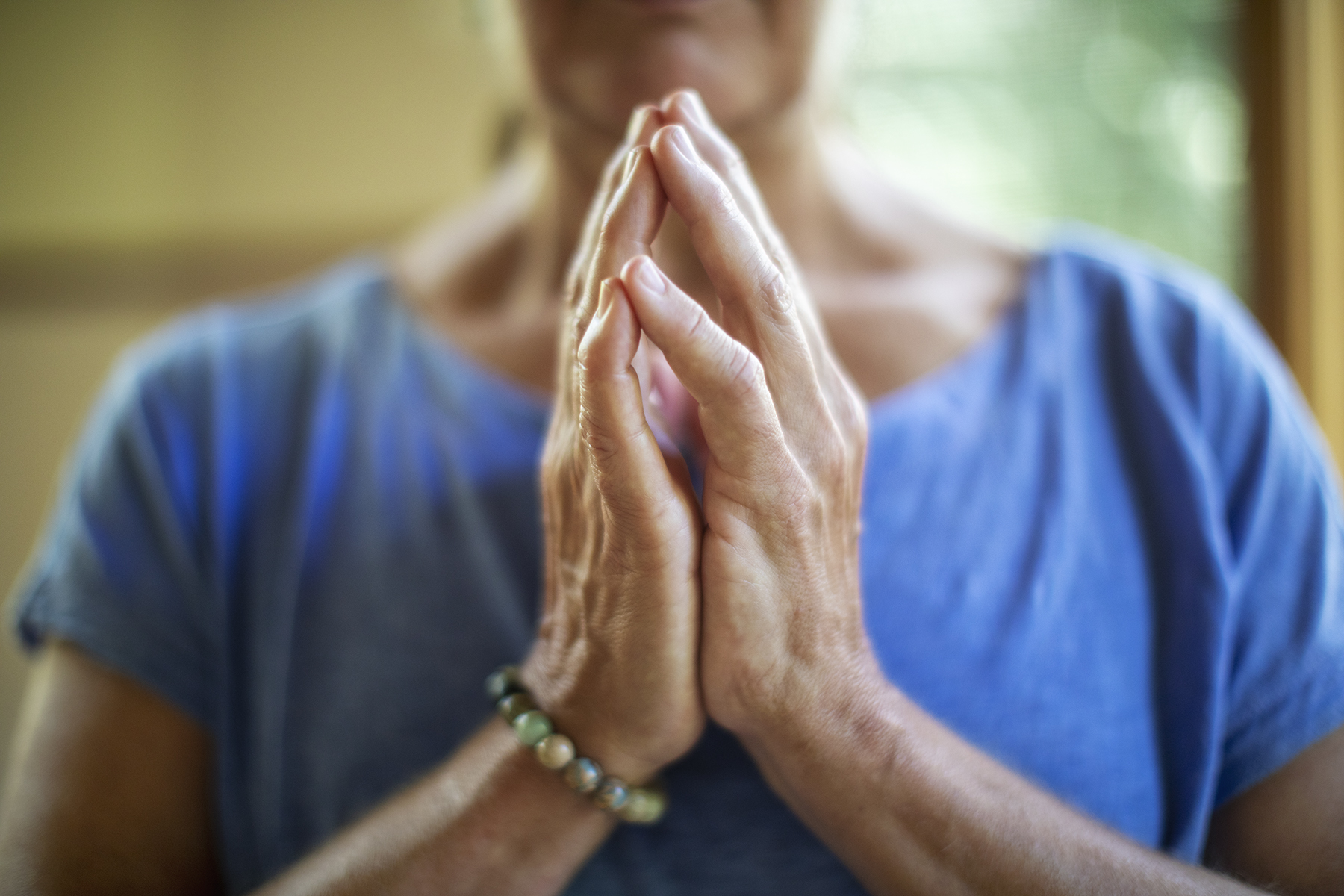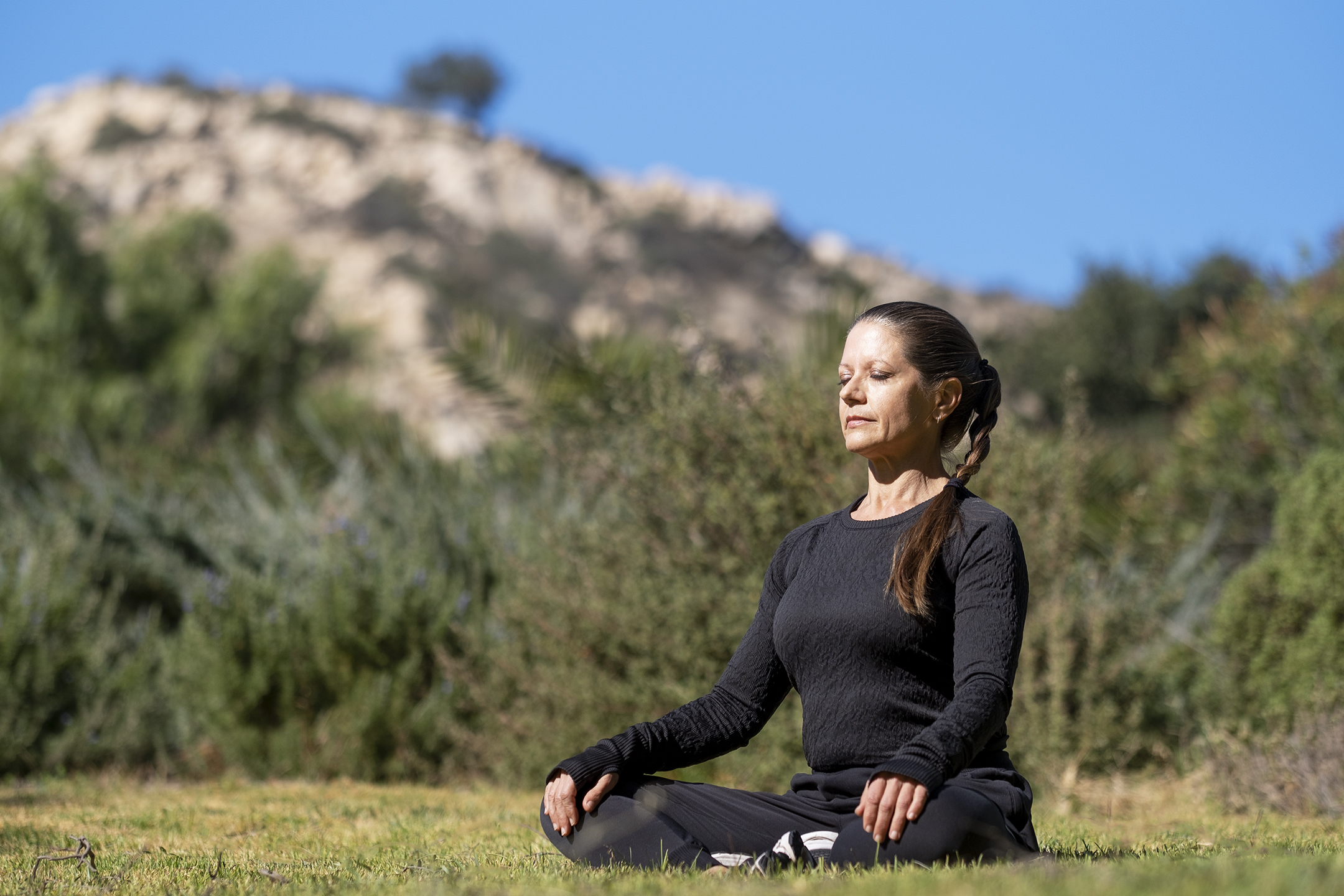Regenerate Your Juju, Reclaim Your Body-Mind Health

You’ve probably read by now that stress-related diseases and mental-health conditions rank among the top contributors to our healthcare expenses. Many sources suggest that up to 85 percent of all U.S. doctor’s office visits are tied to stress. Still, most people don’t really understand the power that chronic, unmanaged stress has to decimate their body-mind health, or by what means.
Most of us get that unrelenting stress is bad for us, sure. But we don’t fully grasp how it breaks down our bodies and brains or what we can do to prevent that. This means most of us must learn this for ourselves — the hard way.
That was certainly true for me. I’ve written at length about some of my more brutal lessons in body-mind breakdown:
- The time my eyelashes fell out.
- The time I broke my foot stomping in frustration.
- The days I could barely digest food.
- The countless nights I couldn’t sleep.
I’ve also written quite a bit about the strategies I’ve used (and still rely on) to reduce, reframe, and offset mental stress, and I’ll share some of my favorites with you in a moment.
But first, I want to talk about juju. YOUR juju. Because yes, you have it — or at least, you used to. And if you had it once, you can get it back.
Juju Reclaimed
“Juju” is not a scientific term. It’s a word of West African origin that refers to a special sort of magic — a power believed to be associated with certain objects and conferred upon those who own or touch them.
Juju has taken on a broader, more secular meaning in modern-day slang. It typically refers to a sort of positive, ineffable, magnetic power — an energy, feeling, or vibe we can create, give off, or experience.
When our juju is good, we feel resilient, capable, and confident. But when our juju is dwindling or zapped, we feel less capable of handling or responding to the world “out there.” And as a result, we may start to act out, shut down, or both.
The less good juju we have, the more vulnerable we become to automatic, convenient, lowest-common-denominator choices.
Feeling stressed out and run down leaves us at the mercy of cravings, temptation, and bad decisions — about what we eat and drink, whether or not we exercise, how much TV we watch, when (or if) we leave work, when we go to bed, and so on.
We might be inclined to reach for unhealthy comforts and “rewards” as consolation for what we are enduring — or as an antidote to our pain. And, of course, a lot of those seemingly comforting “solutions” (unhealthy foods, booze, drugs, late-night TV binges) work against our resilience and capacity to cope.
The more dysregulated and depleted we become, the more reactive and desperate we feel, and the more we start stumbling and lurching toward carelessness, accidents, and self-injury.
When we’re juju-diminished, we’re most likely to stub a toe, trip and fall, break a glass, slam a finger in a drawer, pick a fight, or pull out into traffic without looking.
We might become less socially open and receptive even as we become more sensitive to perceived criticism and more reactive to everything around us.
It’s also when we’re most likely to pull away from the people who might otherwise bring us the perspective, support, and comfort to break out of our stress cycle.
As noted, all of these dynamics tend to be the cause and the result of a reduction in our juju — instigators in a downward spiral I call the Vicious Cycle of the Unhealthy Default Reality.
Escape from the Vicious Cycle
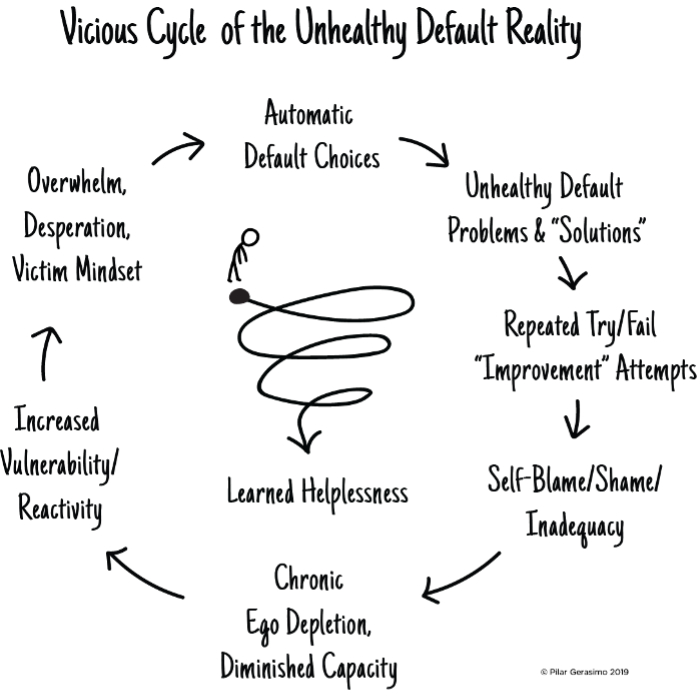
This is a cycle where going along with our society’s default “business as usual” patterns has us hemorrhaging energy and other resources and eventually lapsing into an unfortunate state known as learned helplessness.
In many ways, learned helplessness is the opposite of good mental health. It’s the relinquishing of hope and conscious choice. It’s the abandonment of our belief that we can improve our circumstances. And it’s an absolute juju killer.
So, how can we bust out of this trap? How can you reclaim your juju and get your vitality back on track?
For this, I recommend a very different cycle.
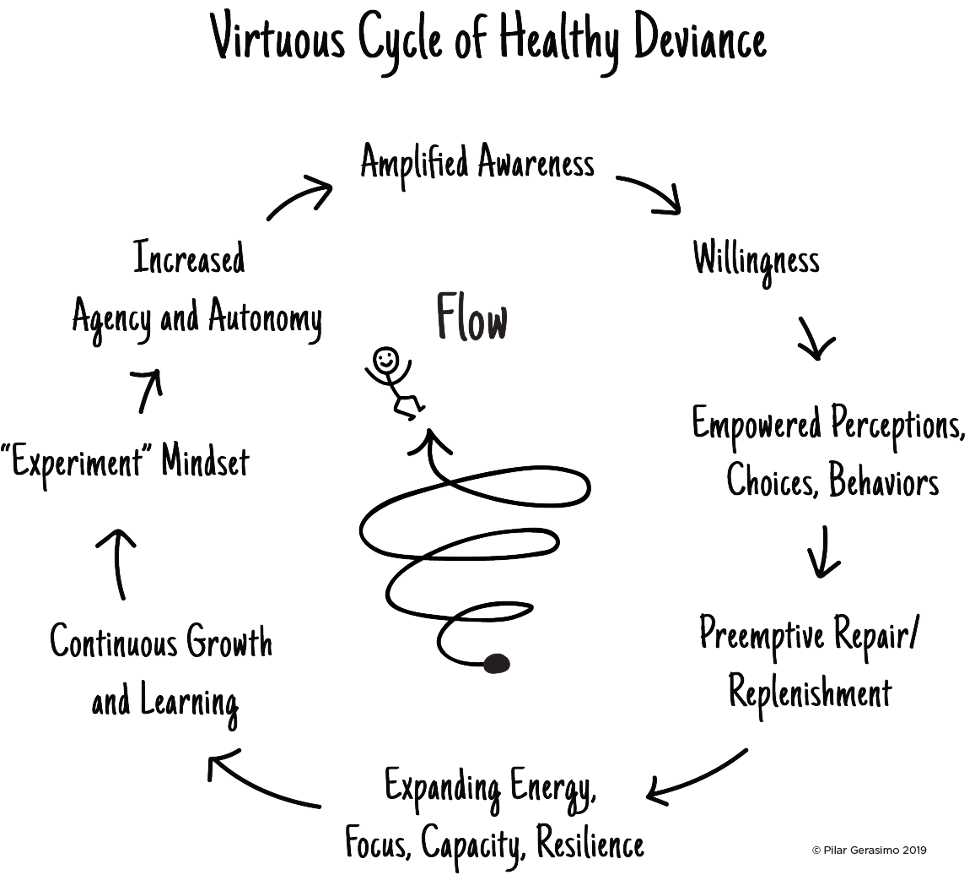
I call it the Virtuous Cycle of Healthy Deviance, and while I can’t cover the whole thing in detail here, I can summarize a few of its key recommendations:
1. Embrace Amplified Awareness. Notice the automatic default choices our culture promotes as “normal” even though they work against virtually all of us: overwork and overstimulation; lack of sleep and rest; inadequate nutrition and hydration; excessive sitting and passive entertainment; exposure to physically and emotionally toxic environments; nonexistent breaks and schedule margins; scant exposure to nature and sunshine; little time with friends and loved ones; unrealistic body ideals. Any of these culprits can do a number on your mental health, and in combination (which is how they typically occur), they can be downright devastating.
2. Practice “Preemptive Repair”: This is not about dragging ourselves to bed when we can no longer think straight or guzzling energy drinks and pep-enhancing supplements when our blood sugar bottoms out. It’s about knowing that we cannot let our unhealthy culture get its fangs into us so deeply. Instead of emphasizing rest and recovery after we’ve grown exhausted, demoralized, anxious, or depressed, we have to begin preemptively repairing and rebalancing ourselves. In contrast, we still have our wits about us — before all that damage gets done.
3. Become a student of your own body-mind. When your body is fritzing on nonstop stress, your brain is too. Your first impulses might not be your best impulses. Simple solutions might seem maddeningly difficult to find. It’s worth understanding how the cortisol and adrenaline overload triggered by chronic stress impacts your entire system — producing neurological chaos, inflammation, hormone imbalances, digestive troubles, headaches, high blood pressure, and more. (Complete my online Weird-Symptom Checklist for a more comprehensive assessment of your body-mind’s current state.) When you learn how your intertwining body-mind systems work together — and how to watch for warning signs — you’ll have far more juju-generating strategies at your disposal.
4. Reclaim your agency and autonomy. Our society’s broadcasted standards of “good enough” are largely unachievable. Other people’s expectations of you might be at odds with what you choose for yourself. If you feel you can’t comfortably do, deliver, or produce what others need or want of you, seek clarity about where your responsibilities truly start and stop. Get honest about how much of a given situation is within your control and where you might be inadvertently writing a role for yourself (star, savior, martyr, pleaser?) that you don’t particularly want to play. Learn to acknowledge your real-life desires and limits. Master the art of saying “no” and requesting meaningful change. (If you want help with any of that, you might be interested in checking out my “How to Renegotiate Your Reality” mini-course.)
Above all, know that your juju matters — not just to you, but to everybody around you because good juju breeds more good juju. It also breeds better body-mind health. And goodness knows this world of ours can certainly use more of that.
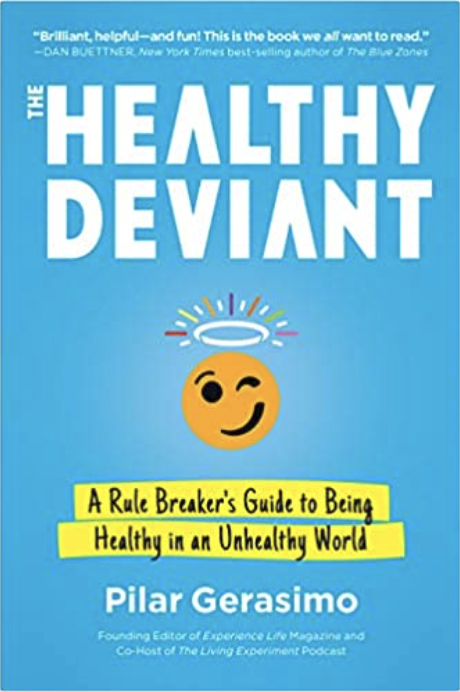
Pilar Gerasimo is an award-winning health journalist and author of The Healthy Deviant: A Rule Breaker’s Guide to Being Healthy in an Unhealthy World. Learn about her online courses and learning communities at www.healthydeviant.com.
All illustrations by Pilar Gerasimo.

